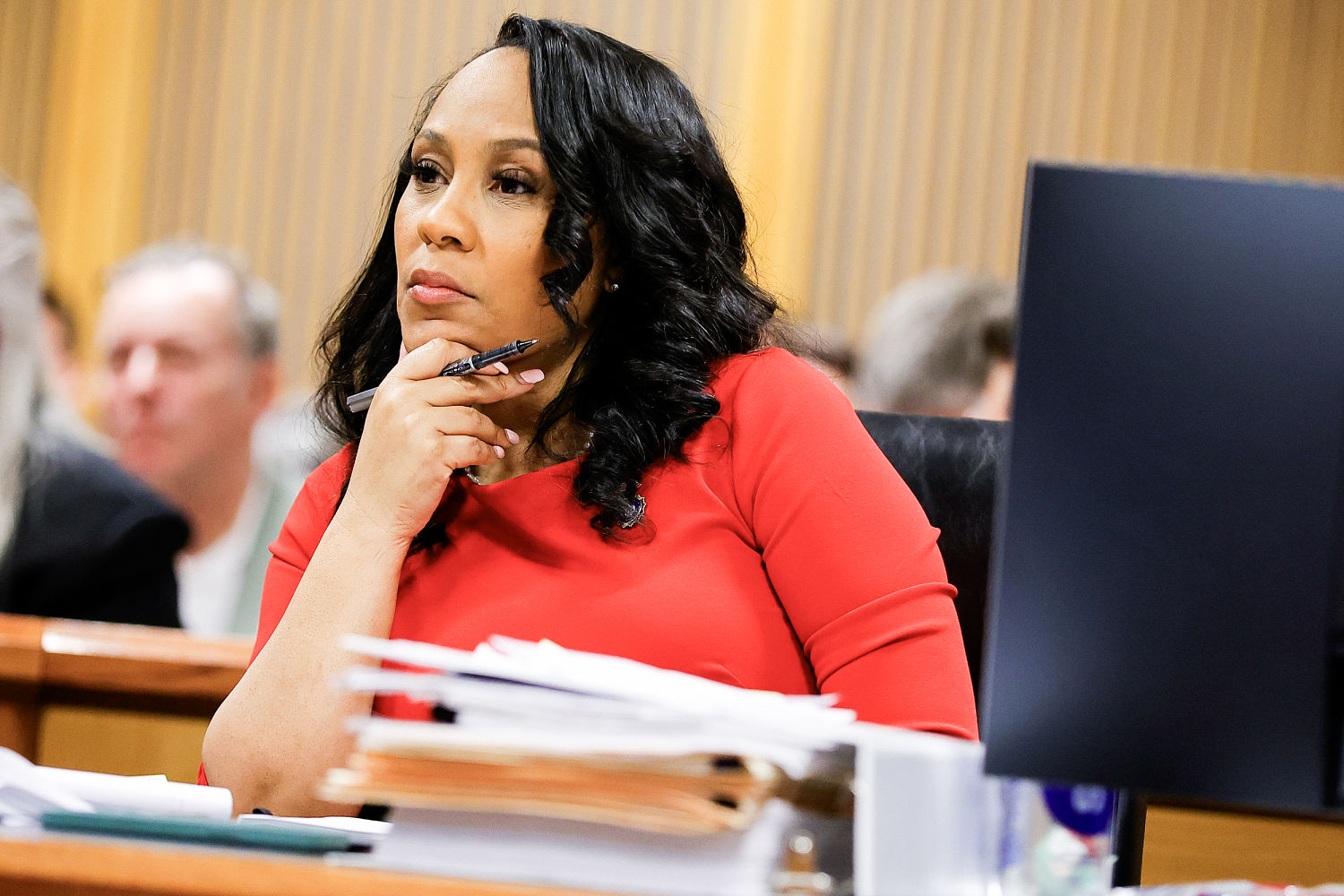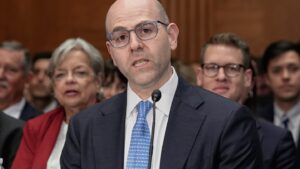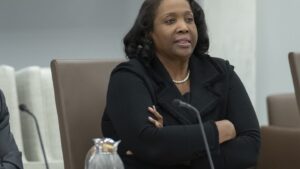The Dictatorship
Senate approves White House economist to serve on Federal Reserve board

WASHINGTON (AP) — The Senate has approved one of President Donald Trump’s top economic advisers for a seat on the Federal Reserve’s governing board, giving the White House greater influence over the central bank just two days before it is expected to vote in favor of reducing its key interest rate.
The vote to confirm Stephen Miran was largely along party lines, 48-47. He was approved by the Senate Banking Committee last week with all Republicans voting in favor and all Democrats opposed.
Miran’s nomination has sparked concerns about the Fed’s longtime independence from day-to-day politics after he said during a committee hearing earlier this month that he would keep his job as chair of the White House’s Council of Economic Advisers, though would take unpaid leave. Senate Democrats have said such an approach is incompatible with an independent Fed.
Senate Democratic Leader Chuck Schumer said ahead of the vote that Miran “has no independence” and would be “nothing more than Donald Trump’s mouthpiece at the Fed.”
The vote was along party lines, with Alaska Sen. Lisa Murkowski the only Republican to vote against Miran.
Miran is completing an unexpired term that ends in January, after Adriana Kugler unexpectedly stepped down from the board Aug. 1. He said if he is appointed to a longer term he would resign from his White House job. Previous presidents have appointed advisers to the Fed, including former chair Ben Bernanke, who served in president George W. Bush’s administration. But Bernanke and others left their White House jobs when joining the board.
Miran said during his Sept. 4 hearing that, if confirmed, “I will act independently, as the Federal Reserve always does, based on my own personal analysis of economic data.”
Last year, Miran criticized what he called the “revolving door” of officials between the White House and the Fed, in a paper he co-wrote with Daniel Katz for the conservative Manhattan Institute. Katz is now chief of staff at the Treasury Department.
Miran’s approval arrives as Trump’s efforts to shape the Fed have been dealt a setback elsewhere. He has sought to fire Fed governor Lisa Cookwho was appointed by former President Joe Biden to a term that ends in 2038. Cook sued to block the firing and won a first round in federal court, after a judge ruled the Trump administration did not have proper cause to remove her.
The administration appealed the ruling, but an appeals court rejected that request late Monday.
Members of the Fed’s board vote on all its interest rate decisions, and also oversee the nation’s financial system.
The jockeying around the Fed is occurring as the economy is entering an uncertain and difficult period. Inflation remains stubbornly above the central bank’s 2% target, though it hasn’t risen as much as many economists feared when Trump first imposed sweeping tariffs on nearly all imports. The Fed typically would raise borrowing costs, or at least keep them elevated, to combat worsening inflation.
At the same time, hiring has weakened considerably and the unemployment rate rose last month to a still-low 4.3%. The central bank often takes the opposite approach when unemployment rises, cutting rates to spur more borrowing, spending and growth.
Economists forecast the Fed will reduce its key rate after its two-day meeting ends Wednesday, to about 4.1% from 4.3%. Trump has demanded much deeper cuts.
The Dictatorship
Appeals court rejects Trump’s bid to unseat Federal Reserve governor Lisa Cook ahead of rate vote

WASHINGTON (AP) — An appeals court ruled Monday that Lisa Cook can remain a Federal Reserve governor, rebuffing President Donald Trump’s efforts to remove her just ahead of a key vote on interest rates.
The Trump administration is expected to quickly turn to the Supreme Court in a last-ditch bid to unseat Cook. The Fed’s next two-day meeting to consider its next interest rate move begins Tuesday morning. And Cook’s lawsuit seeking to permanently block her firing must still make its way through the courts.
The White House campaign to unseat Cook marks an unprecedented bid to reshape the Fed’s seven-member governing board, which was designed to be largely independent from day-to-day politics. No president has fired a sitting Fed governor in the agency’s 112-year history.
Separately, Senate Republicans on Monday confirmed Stephen MiranTrump’s nominee to an open spot on the Fed’s board. Barring any last-minute intervention from the Supreme Court, the Fed’s interest rate setting committee will meet Tuesday and Wednesday with all seven governors and the 12 regional bank presidents.
Twelve of those 19 officials will vote on changing the central bank’s short-term rate: All seven governors plus five regional presidents, who vote on a rotating basis.
Chair Jerome Powell signaled in a high-profile speech last month the Fed would likely cut its key rate at this meeting, from about 4.3% to 4.1%. Other borrowing costs, such as mortgage rates and car loans, have already declined in anticipation of the cut and could move lower.
Trump sought to fire Cook Aug. 25but a federal judge ruled last week that the removal was illegal and reinstated her to the Fed’s board. Trump appointee Bill Pulte has accused Cook of mortgage fraud because she appeared to claim two properties as “primary residences” in July 2021, before she joined the board. Such claims can lead to a lower mortgage rate and smaller down payment than if one of them was declared as a rental property or second home. Cook has denied the charges.
In a 2-1 decision, the appeals court found that Cook’s due process rights were violated because the administration did not give her a formal opportunity to respond to the charges.
The attempt to fire Cook is seen by many legal scholars as a threat to erode the Fed’s longtime political independence. Economists prefer independent central banks because they can do unpopular things like lifting interest rates to combat inflation more easily than elected officials.
Many economists worry that if the Fed falls under the control of the White House, it will keep its key interest rate lower than justified by economic fundamentals to satisfy Trump’s demands for cheaper borrowing. That could accelerate inflation and could also push up longer-term interest rates, such as those on mortgages and car loans. Investors may demand a higher yield to own bonds to offset greater inflation in the future, lifting borrowing costs for the U.S. government and the entire economy.
Separately, Miran chairs the White House’s Council of Economic Advisers and said earlier this month he would take unpaid leave but otherwise keep his job while serving on the Fed’s board. It will be the first time in decades that an executive branch official has served at the Fed.
Miran has been appointed to finish a term that expires in January, but he could remain in the seat if no replacement is chosen.
Cook has denied any wrongdoing and has not been charged with a crime. According to documents obtained by The Associated PressCook did specify that her Atlanta condo would be a “vacation home,” according to a loan estimate she obtained in May 2021. And in a form seeking a security clearance, she described it as a “2nd home.” Both documents appear to undercut the administration’s claims of fraud.
Last week, U.S. District Court Judge Jia Cobb ruled that the administration had not satisfied a legal requirement that Fed governors can only be fired “for cause,” which she said was limited to misconduct while in office. Cook did not join the Fed’s board until 2022.
In their emergency appeal, Trump’s lawyers argued that even if the conduct occurred before her time as governor, her alleged action “indisputably calls into question Cook’s trustworthiness and whether she can be a responsible steward of the interest rates and economy.”
Trump has repeatedly attacked Powell and the other members of the Fed’s interest-rate setting committee for not cutting the short-term interest rate they control more quickly. Trump has said he thinks it should be as low as 1.3%, a level that no Fed official and few economists support.
Cook is the first Black woman to serve as a Fed governor. She was a Marshall Scholar and received degrees from Oxford University and Spelman College, and prior to joining the board she taught at Michigan State University and Harvard University’s Kennedy School of Government.
The Dictatorship
What to know after US says it has reached framework deal with China to keep TikTok in operation

A central question to TikTok’s potential shutdown saga has been whether the popular social video platform would keep its algorithm — the secret sauce that powers its addictive video feed — after it’s divested from Chinese parent company ByteDance.
Now, it appears that it can. Wang Jingtao, deputy director of China’s Central Cyberspace Affairs Commission, told reporters in Madrid Monday there was consensus on authorization of “the use of intellectual property rights such as (TikTok’s) algorithm” — a main sticking point in the deal.
The sides also agreed on entrusting a partner with handling U.S. user data and content security, he said. But while China has agreed that a divested TikTok could use its algorithm, it’s uncertain how that would work.
What
is the deal?
Little is known about the actual deal in the works, including what companies are involved and whether the United States would have a stake in TikTok. Li Chenggang, China’s international trade representative, said the two sides have reached “basic framework consensus” to properly solve TikTok-related issues in a cooperative way, reduce investment barriers and promote related economic and trade cooperation. The sides now have until Dec. 16 to hash out the details, following the latest deadline extension by the Trump administration.
U.S. Treasury Secretary Scott Bessent said in a press conference this week after the latest round of trade talks between the world’s top two economies concluded in Madrid that U.S. President Donald Trump and Chinese President Xi Jinping would speak Friday to possibly finalize the deal. He said the objective of the deal would be to switch to American ownership.
He did not disclose the terms of the deal, saying that it is between two private parties, but added that “the commercial terms have been agreed upon.”
Oracle Corp. has been floated as a likely buyer for the platform. Representatives for the company did not immediately respond to a message for comment on Monday and Tuesday.
In Madrid, U.S. Trade Representative Jamieson Greer said the team was “very focused on TikTok and making sure that it was a deal that is fair for the Chinese,” but also “completely respects U.S. national security concerns.”
The sides also agreed on entrusting a partner with handling U.S. user data and content security, he said.
What about the algorithm?
At arguments in the Supreme Court in January, a lawyer for TikTok and its Chinese parent company ByteDance Ltd. told the justices how difficult it would be to consummate a deal that complies with the TikTok law, especially since Chinese law restricts the sale of the proprietary algorithm that has made the social media platform wildly successful.
American officials have previously warned the algorithm that fuels what users see on the app is vulnerable to manipulation by Chinese authorities, who can use it to shape content on the platform in a way that’s difficult to detect.
TikTok has said that the U.S. never presented evidence that China has attempted to manipulate content on its U.S. platform
The House Select Committee on China says any deal between Beijing and Washington must comply with a law requiring TikTok to be divested from its Chinese ownership or face a ban in the U.S.
“It wouldn’t be in compliance if the algorithm is Chinese. There can’t be any shared algorithm with ByteDance,” said a committee spokesperson.
Rep. Raja Krishnamoorthi, the committee’s ranking Democrat, said he wants information on the ownership structure.
“Underpinning all of our concerns is the Chinese Communist Party’s access to American data,” he said. The social media platform needs user data to determine what to show users, and Krishnamoorthi said he would be open to discussions if the app is protected from Beijing’s infiltration.
Extensions continue
Though he has no clear legal basis to do so, Trump has continued to extend the deadline for TikTok to avoid a ban in the U.S. The latest extension came Tuesday, a day before the last deadline was set to expire.
This gives his administration more time to broker a deal to bring the social media platform under American ownership.
It is not clear how many times Trump can keep extending the ban as the government continues to try to negotiate a deal for TikTok, which is owned by China’s ByteDance. While there is no clear legal basis for the extensions, so far, there have been no legal challenges against the administration. Trump has amassed more than 15 million followers on TikTok since he joined last yearand he has credited the trendsetting platform with helping him gain traction among young voters. He said in January that he has a “warm spot for TikTok.”
TikTok did not immediately respond to a message for comment on Tuesday.
How do Americans view TikTok?
For now, TikTok continues to function for its 170 million users in the U.S. Tech giants Apple, Google and Oracle were persuaded to continue to offer and support the app, on the promise that Trump’s Justice Department would not use the law to seek potentially steep fines against them.
Americans are even more closely divided on what to do about TikTok than they were two years ago.
A recent Pew Research Center survey found that about one-third of Americans said they supported a TikTok ban, down from 50% in March 2023. Roughly one-third said they would oppose a ban, and a similar percentage said they weren’t sure.
Among those who said they supported banning the social media platform, about 8 in 10 cited concerns over users’ data security being at risk as a major factor in their decision, according to the report.
The Dictatorship
Georgia Supreme Court declines to hear Fani Willis’ appeal challenging her disqualification

In a move that could effectively end the Georgia prosecution of Donald Trump and others, the Supreme Court of Georgia on Tuesday declined to take up Fulton County District Attorney Fani Willis’ attempt to continue prosecuting the state election interference case.
Three state justices dissented from the refusal to consider the appeal, arguing that it presented an important issue worth resolving: whether a lawyer can be disqualified “based on the appearance of impropriety alone.”
While the denial keeps Willis and her office from overseeing the case, it could also effectively end it completely, or at least delay it even longer. When a prosecutor’s office in Georgia is disqualified, finding a new one falls to a state panel called the Prosecuting Attorneys’ Council of Georgia. As an example of how long that process can take and how it can affect the outcome, look at the situation of Georgia Lt. Gov. Burt Jones, whom Willis was disqualified from prosecuting after she hosted a fundraiser for a Democrat who later became Jones’ opponent in the 2022 election. After nearly two years, the Republican head of the panel said he would handle it himself. And then he announced he wouldn’t seek charges against Jones.
And the Jones matter involved just one person. Finding a new prosecutor to take on the complex case against Trump and several other defendants could prove difficult, to say nothing of how a new prosecutor would view the case. Either way, Trump himself would not be prosecuted while he is still in office. His two federal cases were dismissed following his 2024 election victory, and he is appealing his New York state conviction in the only one of his four criminal cases that went to trial before the election.
Like the state’s top court on Tuesday, a state appeals court panel was likewise divided last year when it ruled that Willis and her office should be disqualified from prosecuting the case against Trump and others for their allegedly criminal actions in trying to overturn the 2020 election that Trump lost to Joe Biden.
“After carefully considering the trial court’s findings in its order, we conclude that it erred by failing to disqualify DA Willis and her office,” the appeals court said of the prior ruling from the trial judge, Scott McAfee.
Trump and other defendants in the case had argued Willis improperly profited from the hiring of special prosecutor Nathan Wade, with whom she had a romantic relationship, and that it gave the elected district attorney an impermissible stake in the prosecution. McAfee said the defense failed to prove an actual conflict of interest but that the appearance of impropriety meant that either Willis (and her office) or Wade had to go. Wade resigned that same day.
“The remedy crafted by the trial court to prevent an ongoing appearance of impropriety did nothing to address the appearance of impropriety that existed at times when DA Willis was exercising her broad pretrial discretion about who to prosecute and what charges to bring,“ the appeals court said in the opinion by Judge Trenton Brown, who was joined by Judge Todd Markle.
A dissenting appeals court judge said the majority’s opinion was unsupported by law and called it particularly troubling that the majority interfered with the trial judge’s discretion. “Given the unique role of the trial court and the fact that it is the court which has broad discretion to impose a remedy that fits the situation as it finds it to be, we should resist the temptation to interfere with that discretion, including its chosen remedy, just because we happen to see things differently,” Judge Ben Land wrote.
Subscribe to the Deadline: Legal Newsletter for expert analysis on the top legal stories of the week, including updates from the Supreme Court and developments in the Trump administration’s legal cases.
Jordan Rubin is the Deadline: Legal Blog writer. He was a prosecutor for the New York County District Attorney’s Office in Manhattan and is the author of “Bizarro,” a book about the secret war on synthetic drugs. Before he joined BLN, he was a legal reporter for Bloomberg Law.
-
Uncategorized10 months ago
Bob Good to step down as Freedom Caucus chair this week
-

 The Josh Fourrier Show10 months ago
The Josh Fourrier Show10 months agoDOOMSDAY: Trump won, now what?
-

 Politics7 months ago
Politics7 months agoFormer ‘Squad’ members launching ‘Bowman and Bush’ YouTube show
-

 Politics10 months ago
Politics10 months agoWhat 7 political experts will be watching at Tuesday’s debate
-

 The Dictatorship7 months ago
The Dictatorship7 months agoPete Hegseth’s tenure at the Pentagon goes from bad to worse
-

 Politics10 months ago
Politics10 months agoHow Republicans could foil Harris’ Supreme Court plans if she’s elected
-

 The Dictatorship7 months ago
The Dictatorship7 months agoLuigi Mangione acknowledges public support in first official statement since arrest
-
Economy10 months ago
Fed moves to protect weakening job market with bold rate cut







